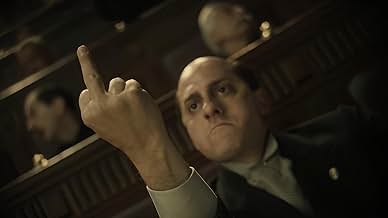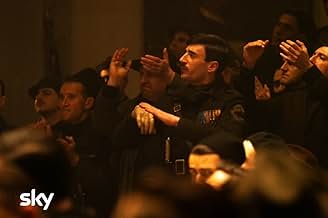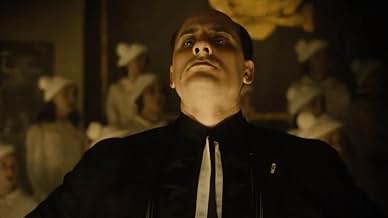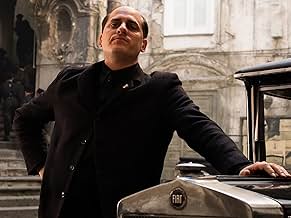Chronik des Aufstiegs des italienischen Diktators Benito Mussolini in der Geschichte eines Landes, das vor der Diktatur kapitulierte.Chronik des Aufstiegs des italienischen Diktators Benito Mussolini in der Geschichte eines Landes, das vor der Diktatur kapitulierte.Chronik des Aufstiegs des italienischen Diktators Benito Mussolini in der Geschichte eines Landes, das vor der Diktatur kapitulierte.
- Auszeichnungen
- 2 wins total
Folgen durchsuchen
Empfohlene Bewertungen
While the cinematography is out for everyone to appreciate, I feel a need to stress a couple of key points international audiences might miss.
First and foremost: the series is based on the first of four books about the life of Mussolini, and while they are routinely described as "novels", they are in fact impressively researched from a historical point. Pretty much every dialogue, speech, document and event are openly sourced and beyond question.
While the staging frequently and blatantly is not realistic in order to make the show more spectacular, pretty much everything happened as you see it - including a D'Annunzio's Japanese samurai secretary and other apparently absurd elements.
My second point is about the acting and language. While it will fly above the heads of anyone not _very_ experienced with Italian, the work behind regional accents, lapses into dialects and the very speech patterns of 100 years ago is exceptional indeed. It is a shame this will mostly go unnoticed, as it actually conveys a fair bit of refinement to an already stellar ensemble performance.
Lastly, the (not present in the books) stabs at current politics are far more varied than expected. Like, everyone can understand a sudden fourth-wall-breaking "Make Italy Great Again!", but you'll probably miss the reference to the catastrophic Berlusconi era (delivered via subtle voice and body acting, or even just a brief costume change), or to the sorry state of the last few recent Italian legislatures.
In short: come for the show, stay for the history lesson... and see it with an Italian resident if you can to enjoy it at its fullest.
First and foremost: the series is based on the first of four books about the life of Mussolini, and while they are routinely described as "novels", they are in fact impressively researched from a historical point. Pretty much every dialogue, speech, document and event are openly sourced and beyond question.
While the staging frequently and blatantly is not realistic in order to make the show more spectacular, pretty much everything happened as you see it - including a D'Annunzio's Japanese samurai secretary and other apparently absurd elements.
My second point is about the acting and language. While it will fly above the heads of anyone not _very_ experienced with Italian, the work behind regional accents, lapses into dialects and the very speech patterns of 100 years ago is exceptional indeed. It is a shame this will mostly go unnoticed, as it actually conveys a fair bit of refinement to an already stellar ensemble performance.
Lastly, the (not present in the books) stabs at current politics are far more varied than expected. Like, everyone can understand a sudden fourth-wall-breaking "Make Italy Great Again!", but you'll probably miss the reference to the catastrophic Berlusconi era (delivered via subtle voice and body acting, or even just a brief costume change), or to the sorry state of the last few recent Italian legislatures.
In short: come for the show, stay for the history lesson... and see it with an Italian resident if you can to enjoy it at its fullest.
For those who have any interest in history, politics, and lessons on human nature, this is the show for you. Seeing the rise of Mussolini in such a way - with Luca Marinelli frequently breaking the fourth wall to speak to us, his audience - keeps it captivating and really holds up to the meta spectacle of his character. Despite the seriousness of the topic, the biting sarcasm and amusing moments keep it entertaining, too. Of course, for anyone who's been following the recent global rise in certain political trends, they'll undoubtedly feel a little uneasy when recognizing the patterns in today's day and age. An impressive production, Luca Marinelli's portrayal of the famous Italian dictator is downright stupendous. A wholehearted recommendation to watch and be amazed by M - Son of the Century.
The english subtitles are a disaster. They look like automated translations not reviewed by someone who understand italian. For example "Margarita" (the name of a woman) is translated as "margarita pizza". Or "No, no" is translated "ninth", because in italian "nono" means "ninth".
Sometimes these bugs don't help comprehension. They mix up pronouns: "They kick it out" instead of "They kick him out". They don't take into account the formal you that in italian is she. For some complex sentences there is no analysis done by a human : "his husband".
An amateur job done by incompetents.
Such a magnificent work deserves better.
Sometimes these bugs don't help comprehension. They mix up pronouns: "They kick it out" instead of "They kick him out". They don't take into account the formal you that in italian is she. For some complex sentences there is no analysis done by a human : "his husband".
An amateur job done by incompetents.
Such a magnificent work deserves better.
Compelling plot, striking photography, excellent acting by Marinelli. Above all, a solid portrayal of a particular historical period.
Much more to be appreciated if you speak Italian, because Marinelli's performance is truly a masterpiece, both from a linguistic and human point of view. M is a winning example of how history should be represented in cinema: hard and raw, without unnecessary words or unnecessary events based on fiction.
I really recommend its viewing. However, do not expect a simple and straightforward viewing; the story is purely described, there is no shortage of harsh scenes and I felt like some stories missed some details.
What is interesting is that the meaning of some of the pictures goes beyond the simple political figure to the man, with his fears and weaknesses. Things that, of the figure of Mussolini, never really came out of that period.
Excellent cinematic work.
Much more to be appreciated if you speak Italian, because Marinelli's performance is truly a masterpiece, both from a linguistic and human point of view. M is a winning example of how history should be represented in cinema: hard and raw, without unnecessary words or unnecessary events based on fiction.
I really recommend its viewing. However, do not expect a simple and straightforward viewing; the story is purely described, there is no shortage of harsh scenes and I felt like some stories missed some details.
What is interesting is that the meaning of some of the pictures goes beyond the simple political figure to the man, with his fears and weaknesses. Things that, of the figure of Mussolini, never really came out of that period.
Excellent cinematic work.
The header here is not my line but taken from when Mussolini sometimes bursts through the fourth wall and comments to the viewer. This was a superb attempt at capturing the rise of a chaotic man during one of the most chaotic periods of history.
Mussolini was flawed, selfish, vindictive and thuggish - and so very full of contradictions.
What this series perfectly captures is the influence of Margherita Sarfatti, his lover and his principal advisor. She coins the best line to describe his motivation and that of fascism 'Take what you want by any means.' This is both chilling and a warning from history... One reviewer here talks about how far fetched the story becomes - A Samurai ? Yes he featured in real life. He influenced Italian poets to introduce Haiku! However bizarre the story seems to be, much of what you see is really not that far fetched.
Mussolini was flawed, selfish, vindictive and thuggish - and so very full of contradictions.
What this series perfectly captures is the influence of Margherita Sarfatti, his lover and his principal advisor. She coins the best line to describe his motivation and that of fascism 'Take what you want by any means.' This is both chilling and a warning from history... One reviewer here talks about how far fetched the story becomes - A Samurai ? Yes he featured in real life. He influenced Italian poets to introduce Haiku! However bizarre the story seems to be, much of what you see is really not that far fetched.
Wusstest du schon
- WissenswertesWhen Joe Wright got on board as director, at first he meant to have the actors say their lines in English. Then he changed his mind and chose to shoot the series in Italian, for a higher immediacy.
Top-Auswahl
Melde dich zum Bewerten an und greife auf die Watchlist für personalisierte Empfehlungen zu.
- How many seasons does Mussolini: Son of the Century have?Powered by Alexa
Details
- Erscheinungsdatum
- Herkunftsländer
- Offizieller Standort
- Sprache
- Auch bekannt als
- Mussolini: Son of the Century
- Drehorte
- Produktionsfirmen
- Weitere beteiligte Unternehmen bei IMDbPro anzeigen
- Laufzeit52 Minuten
- Farbe
Zu dieser Seite beitragen
Bearbeitung vorschlagen oder fehlenden Inhalt hinzufügen

Oberste Lücke
By what name was M - Il figlio del secolo (2024) officially released in India in English?
Antwort
![Trailer Season 1 [OV] ansehen](https://m.media-amazon.com/images/M/MV5BYWM4MjYyMDktOWQwNy00NzNlLTg0OGUtZjk5Yzk0MjA2YmNlXkEyXkFqcGdeQXRyYW5zY29kZS13b3JrZmxvdw@@._V1_QL75_UX500_CR0)


























